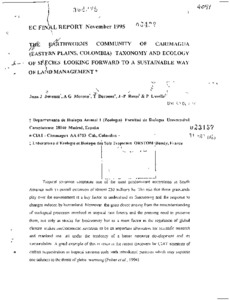The earthworms community of Carimagua (Eastern plains, Colombia) : taxonomy and ecology of species. Looking forward to a sustainable way of land management?
Tropical savannas constitute one of the most predominant ecosystems in South America with an overall extension of almost 250 millions ha. The role that these grasslands play over the environment is a key factor to understand its functioning and the response to changes induced by humankind. Moreover, the great doubt arising from the misunderstanding of ecological process involved in a tropical rain forests and the pressing need to preserve them, not only as stock for biodiversity but as a main factor in the regulation of global climate, makes southeamerican savannas to be an important alternative for scientific research and mankind use, all under the tendency of a better resource development and its sustainability. A good sample of this is issues is the recent discovery by CIAT scientists of carbon sequestration in tropical savanna soils with introduced pastures which may suppose one solution to the threat of global warming

